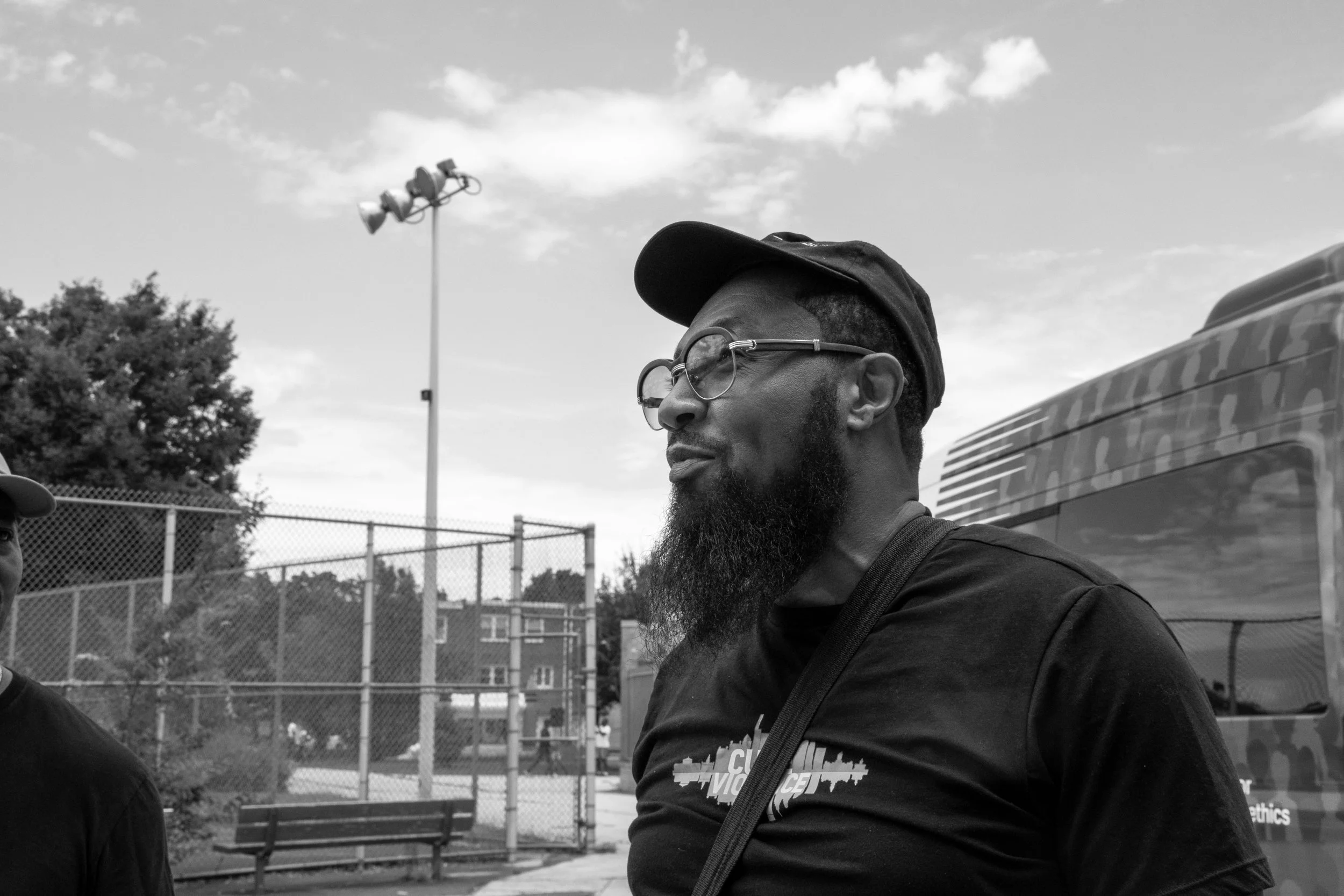

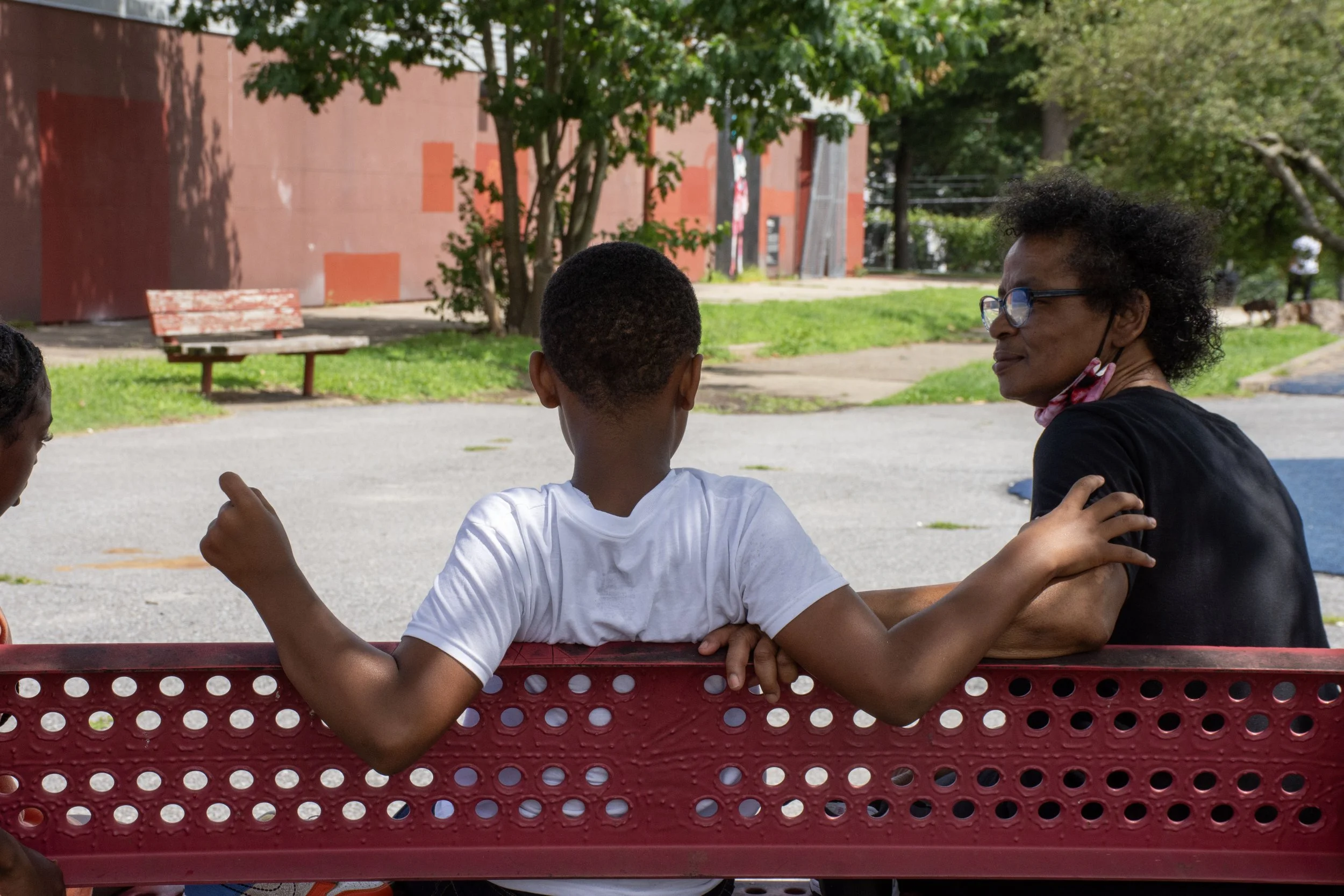

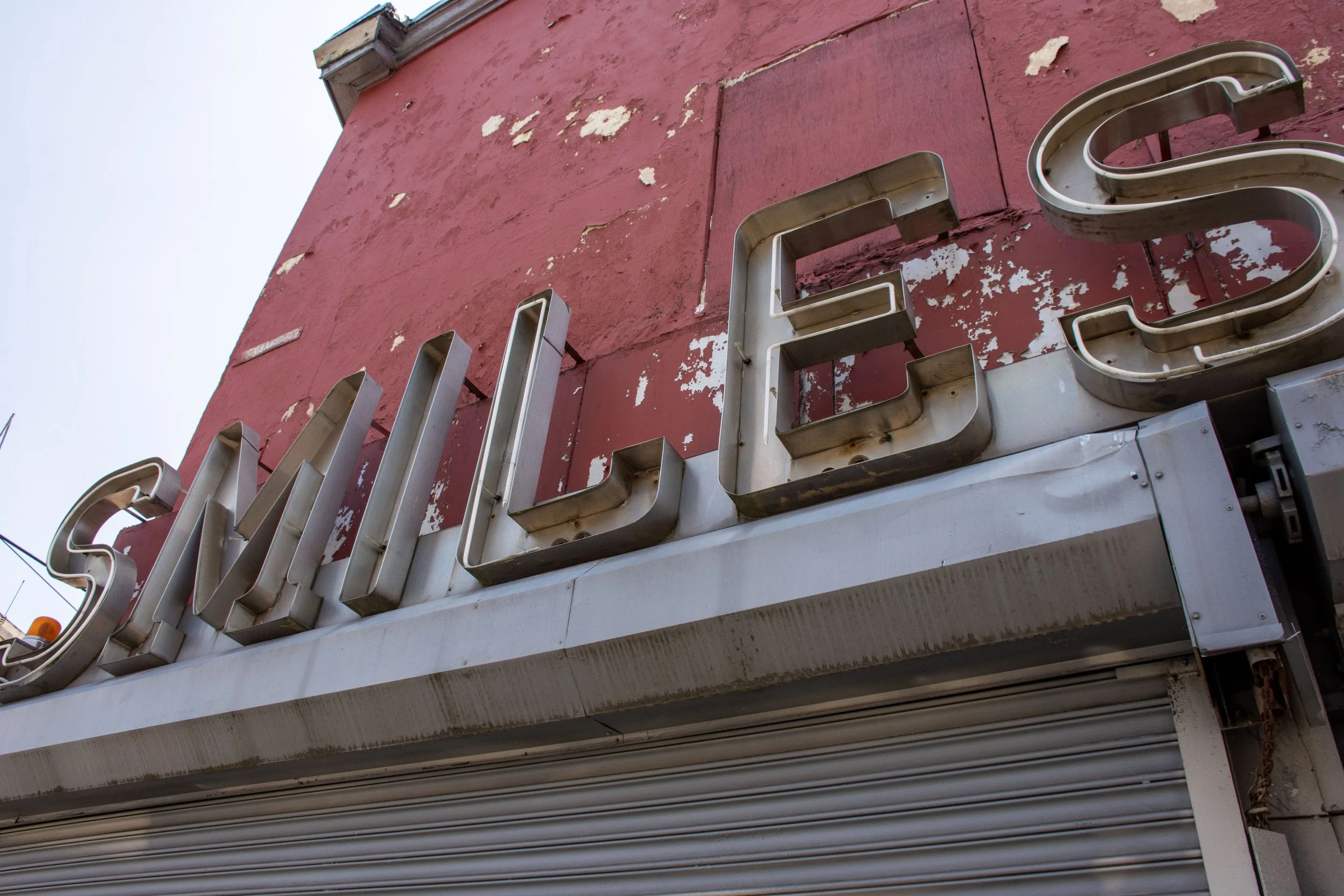
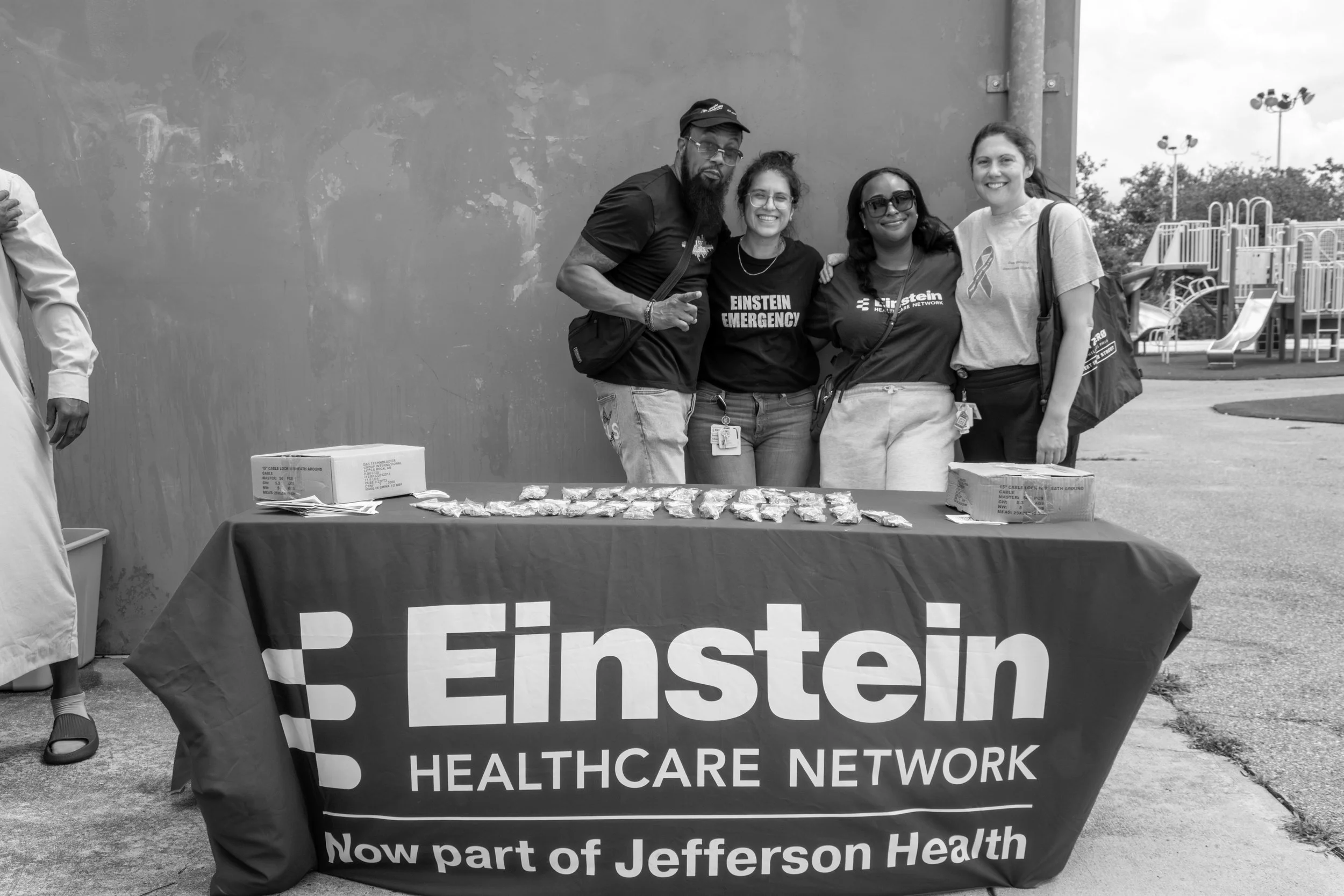
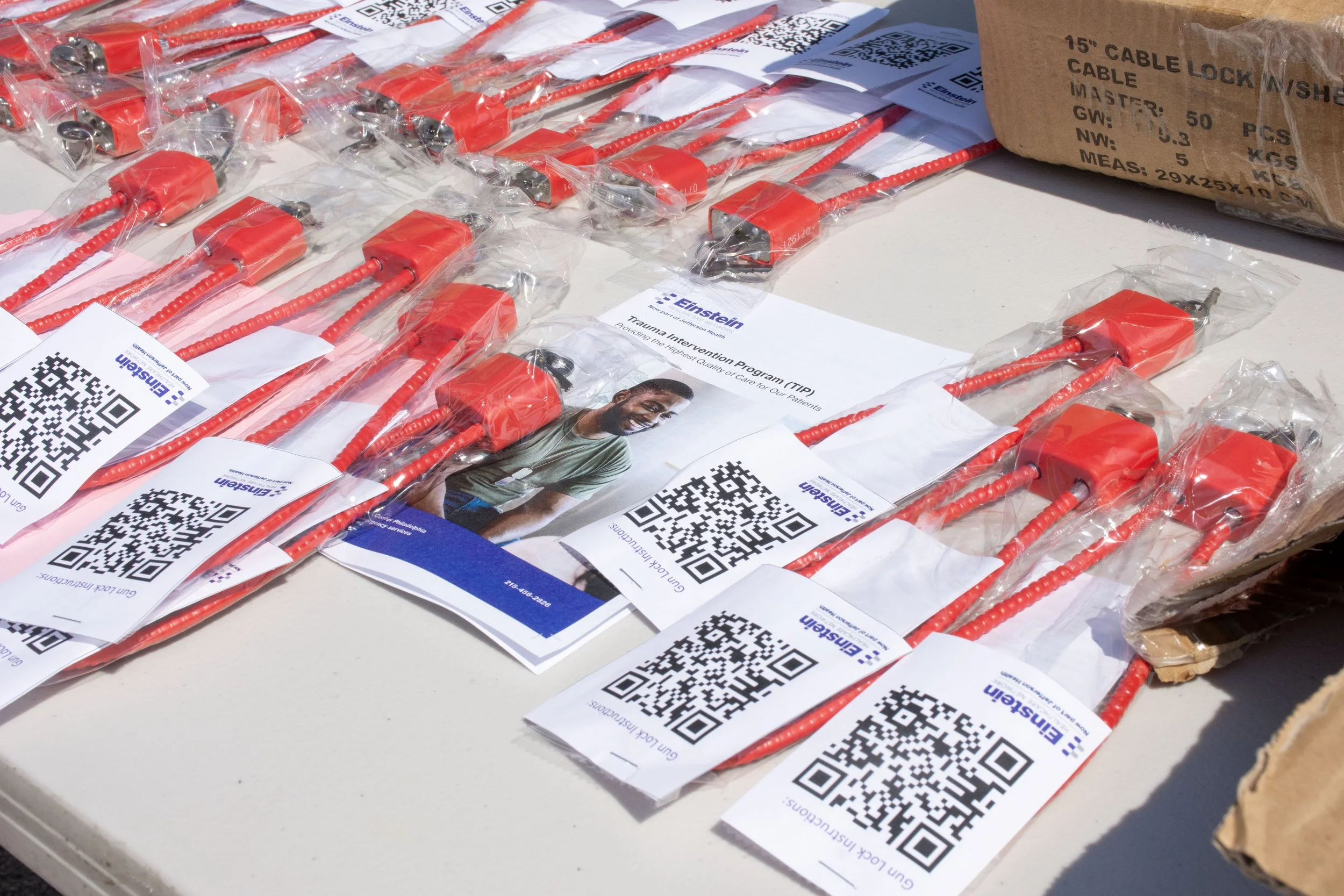

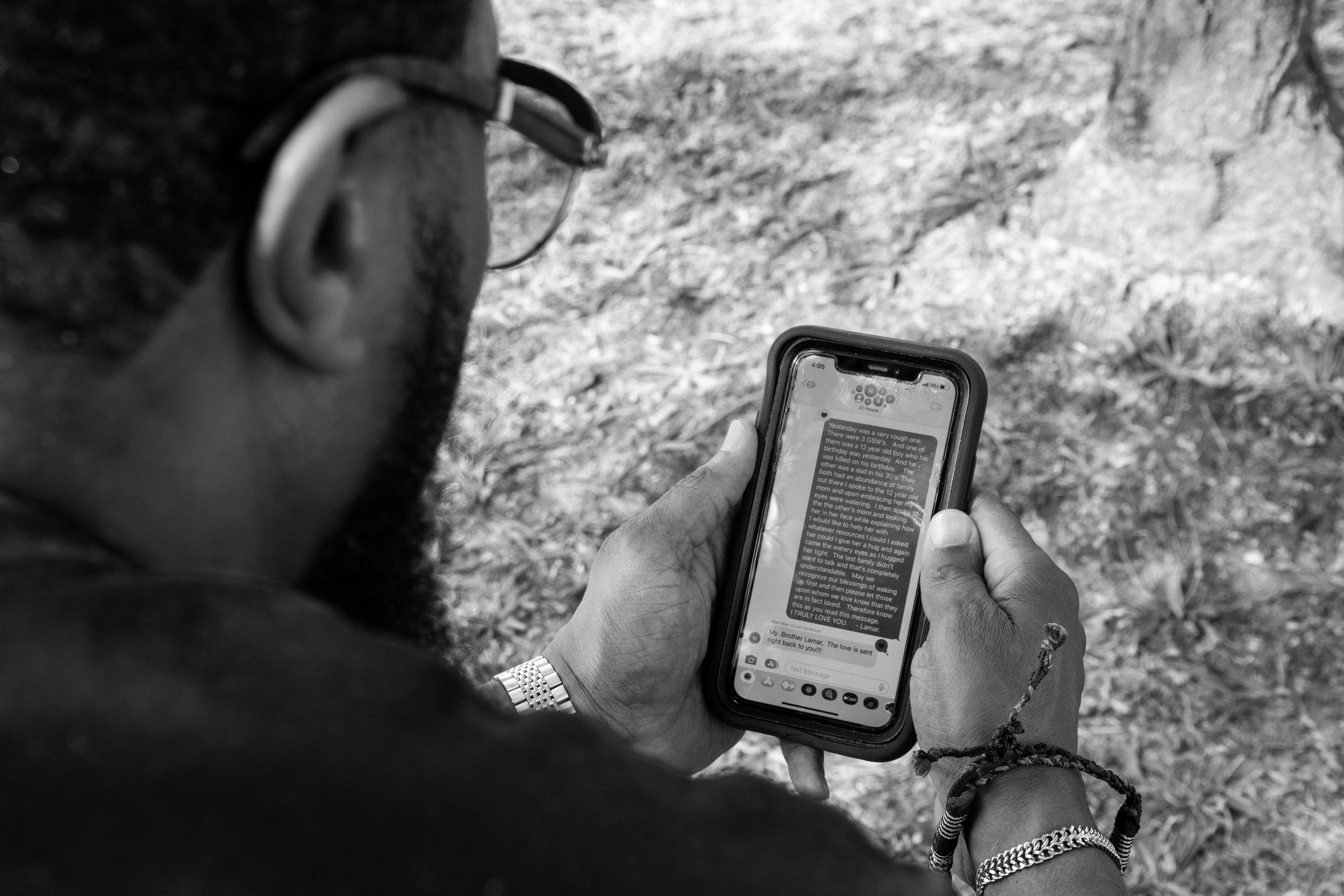

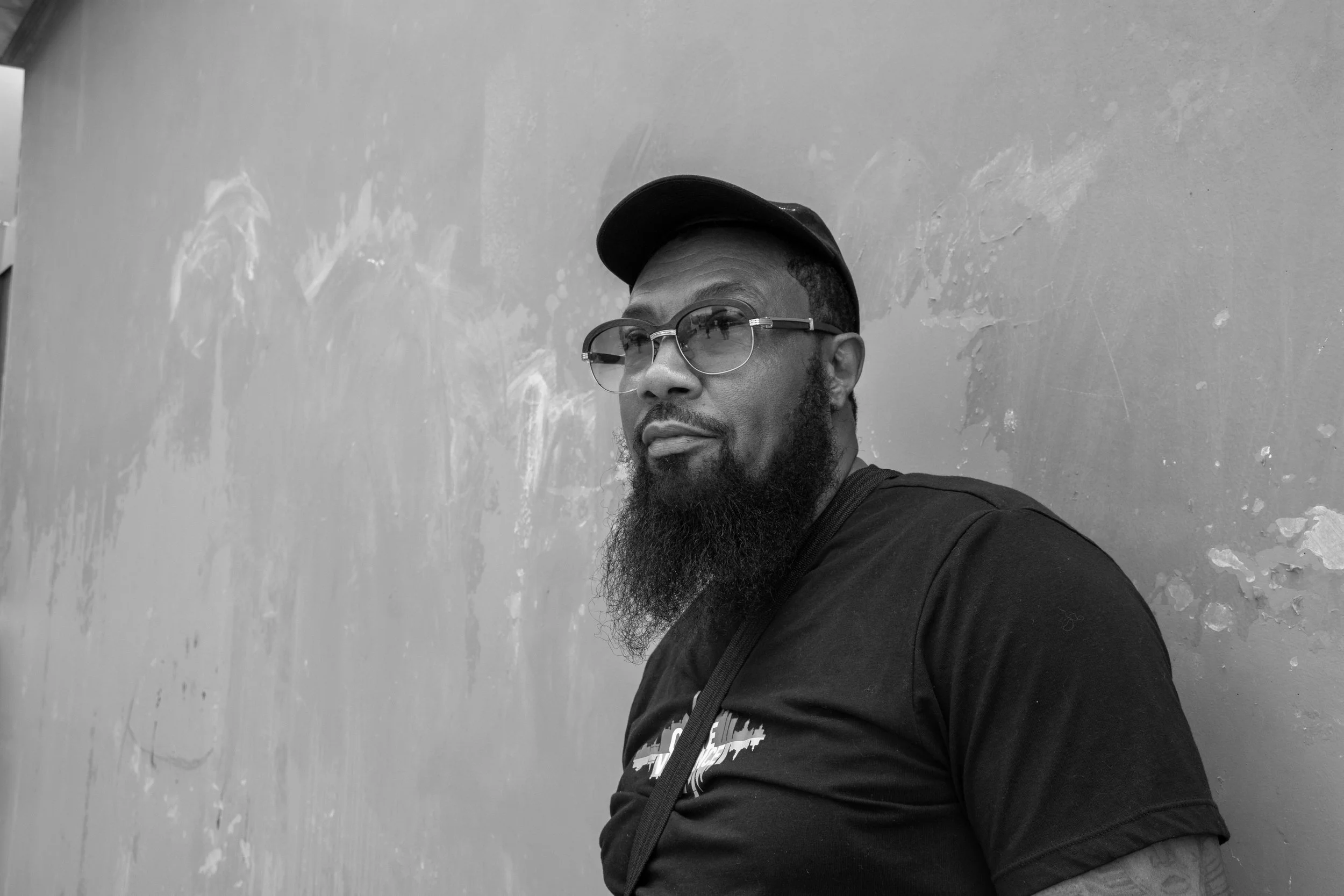

Lamar McCrory
North Philadelphia
“I can be loquacious,” Lamar McCrory warns, pausing in the middle of recalling stories from the many walks of his life. A charismatic public speaker, mentor, and artist, McCrory’s work centers around forming connections throughout his home community of North Philly, whether through his art – poetry, spoken word, acting, fashion design, and more – or by sharing his lived experiences, including being incarcerated for over 25 years.
McCrory has worked for Cure Violence Philadelphia since 2021, first as a driver helping North Philly residents access jobs across the city, and now as a hospital outreach worker at Einstein Medical Center, where he provides comfort and resources to victims of violence and their family members. He believes community resources, strong role models, and employment access are critical to changing norms and de-escalating violence in Philadelphia.
While incarcerated, McCrory leaned on his positive thinking, Muslim faith, and natural aptitude for leadership to connect to those around him as a student and a mentor, building a skillset that he now uses daily at work. His face particularly lights up as he discusses recent accomplishments of friends that he mentored while in prison, eagerly sharing videos of a reggae concert put on by one friend and clips from movies directed by another. (Some of them feature McCrory himself, putting his speaking skills to use as an actor.)
In jail, he liked to ask people every morning to give him a positive word for the day, whether it was optimism, knowledge is power, or the acronym of FOCUS: follow one course until successful. It’s an exercise he now uses when speaking to students, and an approach that he embodies in life.
Role Models
“I grew up with my great aunties and great grandma, and my family had a beauty salon … I can't sit there and say that I know what it feels like to grow up in a household with a mother and father, but I still grew up in a blessed household to practice strong morals, principles, and values. [They] was real stern when they needed to be stern, they was real loving and caring and when they needed to be loving and caring, and they didn't stand in the way of me seeking to accomplish things … everything from soccer to basketball, football, hardball, softball, Boy Scouts.
“I didn't grow up around any older siblings, so that had me looking at other individuals that were older than me … as some form of role models. This guy is driving this, or this person is dressing like this … Some things actually push some youth into looking at the wrong things as being the right things.
“As we get older, we’ll seek to accomplish what it is that a lot of the older individuals was accomplishing … If they liked you, they may sit there and be like ‘young boul, do me a favor, go to the store for me.’ You go, they pay you. But now it may wind up going past the store situation, and you find yourself out there doing other things.”
As a Man Thinketh
“Bad choices and decisions actually snatched a large portion out of my life. I was incarcerated for twenty-something plus years … A lot of people sit there and they say, ‘I don’t have any regrets’ … But who in their right mind would want to be incarcerated? No one in their right mind, unless you were born a fool … I regret losing that chunk of time in my life.
“But while I was incarcerated, I couldn’t sit down and afford to waste my time. So what did I do? I rehabilitated myself. I took up various courses … My first course that I took was horticulture. I did psychology of success, real estate, public speaking … I took up poetry, I took up Arabic. The poetry situation was something that I actually fell into, because during the time I was going to trial, I’d sit there in what they call the cage, waiting to go up to the courtroom for trial. I'd be writing down my thoughts, and my thoughts actually came out like poems.
“We can't change the past … but we can build in the present. Try to plan for the future and try to accomplish some things that we really need to accomplish. While I was away, I became a life coach. I became a mentor. I taught classes on relationships.
“This one young kid, I got the opportunity to aid and assist him in changing his life around … He was a hard little young brother at first, but I pulled him in through a conversation based upon martial arts. I remember I called over Big John – Big John was about 6'2'' … I had his feet like he was dancing on the ceiling … The young brother was like, man, you gotta teach me some of that.
“I said … okay, but you got to do something for me first. You got to read this, In the Spirit by Susan Taylor … He read the book, came back … I said man, take this, In the Spirit of Man by Iyanla Vanzant. I gave him another book, As a Man Thinketh by James Allen … When he came back, he’s like, ‘Man, I like that book.’ This is the day class begins.
“One day he said, ‘tell me how I can keep some of these guys away from me?’ I said you gotta change the thought process of some individuals. I said go get an envelope from the CO [corrections officer] … I wrote a message on it: ‘It is not a man's history, nor is it his environment, but it is the quality of his mind that determines the quality of his success’ … I said sit it on your locker facing the door, and it's going to attract whoever comes in. People like to come in … pry with their eyes. No sooner they see that, they’re gonna change their mind.
“Always keep the messages, all the time. Because you got some people who want to come in your cell and disrupt it, just like you got some people who want to come in your life just for disrupting it … You got some people who are vision vampires and you got those who are vision achievers, they're going to help you achieve your visions, your goals.
“Your word is part of your plan. Speak it if only to say it to yourself, and follow it through to fruition.”
Hospital Response
“I'm over here just trying to do the good work. Sometimes it's kind of hard dealing with the hospital response. Sometimes, it will take a toll on you, especially being inside a trauma room. I'm talking to individuals that were shot, you sit there and you’re looking them in the face, you see the pain in their face … You’re trying to sit down and take their mind off what they’re going through. You're trying to offer them resources.
“One time I ran into a situation where there were two individuals I had to talk to in the trauma room. One was shot here in the stomach and then in his hip. The one on the opposite bed, his leg was shattered. I later found out they were both brothers, and that their mom had twisted her ankle and she was in another part of the emergency room … Her husband was beating her up and was trying to knock her off, trying to kill her, so the sons came and they tried to intercede, and he shot the sons. She said that the husband had her by her shirt, and had a gun that wouldn't shoot … He let her go to get another gun … She jumped up and ran. When she ran out the door, she fell down the steps, twisted her ankle, got up, and started running some more.
“To listen to those stories, or go into the trauma room and you’re talking to somebody and they expire right before you … that's not the everyday stuff that a lot of people sit there and see. I'm not a doctor, I'm a crisis intervention worker. But … sometimes you’re put in a position not to be a doctor of healing the body, but you may have to be a doctor of seeking to heal the mind or heal the spirit.
“I ain't gonna lie to you. One day two weeks ago, there was a young kid, 12 years old. He got killed on his birthday. An older gentleman, he was in his 30s, he got killed, and another one that was in his 20s got killed. Somebody jumped out of a car with an AK-47 and just lit him up … I watched the mom of the 12 year old seem like she was trying to calm down everybody else. I walked over to her and told her my name … I said I’m trying to offer you some resources trying to benefit you any way possible that we can, and I said can I give you a hug? And I felt everything that she was going through. We talked for a minute and I gave her some information, then walked my way over to where the next family was, the 30-year-old guy’s mom … And his daughter came and was like, ‘I want my dad, I want my dad.’
“It was weighing heavy on me. The next day I got up and I went to offer my morning prayer. I laid back down for a minute, but then when I got myself together … tears were just coming down my eyes. I sent out a text to to all my coworkers, friends, and family:
Yesterday was a very rough one. There were three GSWs [gunshot wound victims]. And one of them was a 12 year old boy who his birthday was yesterday. And he was killed on his birthday. The other one was a dad in his 30’s. They both had an abundance of family out there. I spoke to the 12-year-old’s mom, and upon embracing her my eyes were watering. I then spoke to the other’s mom, and looking her in the face while explaining how I would like to help her with whatever resources I could, I asked her could I give her a hug and again came to watery eyes as I hugged her tight. The last family didn't want to talk, and that's completely understandable. May we recognize our blessings of waking up first, and then please let those upon whom we love know that they are in fact loved. Therefore, know this as you read this message. I TRULY LOVE YOU. Lamar.”
Bending the Corner
“With a lot of the senseless killings, what's making some of these people sit there and do what they’re doing? Some people, they are looking for help, and they can't find it in some people. … You got soulless people out here moving around. We’re trying to help individuals turn a light on inside themselves so they can see what they need to do to get on the path that they need to be on.
“Some individuals are not ready to accept the change, because they are first and foremost an enemy to themselves … You turn that light on in them to show them who they are, but they're actually scared of becoming who they can be. They’ll try to harm both you and themselves.
“The only way you can help somebody in that stage is you have to reverse everything, and put it on you. You’re telling them all the things that's going on wrong with you … then you slowly but surely start bending the corner, because you got them with you … So you’re bending their thoughts. You're gonna take them from one extreme to a whole ‘nother extreme, and you have to be patient while you're doing it.
“Driving positions are part of Cure Violence because we’re the ones that get people to jobs. That’s actually de-escalating things because you’re taking some people out of what they may be trying to make a norm, like ‘I can’t find a job, I gotta get out here and hustle, I gotta feed my family.’ … It’s amazing how part of curing the violence is employment, but a lot of people don’t want to work. They say jobs are hard to find.
“Plantation psychosis is individuals who are so caught up in here … They think they’re on the plantation. ‘We ain’t getting by, we ain’t making no money, we just on the plantation.’ No, we ain’t doing the plantation. We ain’t even gonna put that thought in your mind. We ain’t on a slave ship … What we’re on is elevation. We're trying to raise the bar of our choice of living because it's our choice. We can’t stay in a place where it’s like, ‘Man, I just feel like I'm caught up in the ghetto, I ain't got nothing’ … Let’s change that norm.“
School Work
“A lot of the youth, they really like vibing with individuals that they see are going places. I spoke at a school … The same stuff like I'm telling you, I told to the kids there, upper school students. And then I told them about where I put my mind at, and the things I wanted to go ahead and accomplish, that were on my bucket list, such as acting, writing books, motivational speaking, overall just striving to be a successful individual … They started to ask me questions … And a lot of the kids, you know what they said after everything was said and done and we’re leaving? ‘Lamar, can we take a picture with you? Lamar, can I have your autograph?’ You know how that made me feel? They asked me for my autograph. Yo, that’s crazy! Like I was some celebrity. But the thing about it that was worth celebrating is that they liked the message. The message touched them.
“I always tend to speak on how I was raised … Everything ain’t always what it seems. Sometimes a person would look at me and think I came from an excellent household and everything. But I know what it's like to grow up without parents. I know what it's like to not have nothing to eat at times. I know what it's like for a lot of things.
“When we get the opportunity to speak to the youth and we share our stories, our life becomes an open book to them. So what book are they reading? They’re reading Cure Violence, they’re reading our mission statement. Then they’re getting a part of Cure Violence that is not in the book. And that part is our character. That part is our compassion. That part is genuineness and sincerity that we're giving to those we're talking to, especially the youth … And a lot of the young brothers that we get an opportunity to talk to, a lot of the young sisters, we give them direction through what we share. We give them a way to reach out to us if they choose to.”
- - - - - - - - - - - - - - - - - - - - - - - - - - - - - - - - - - - - - - - -
Interview and portraits by Tia Yang | July 2023